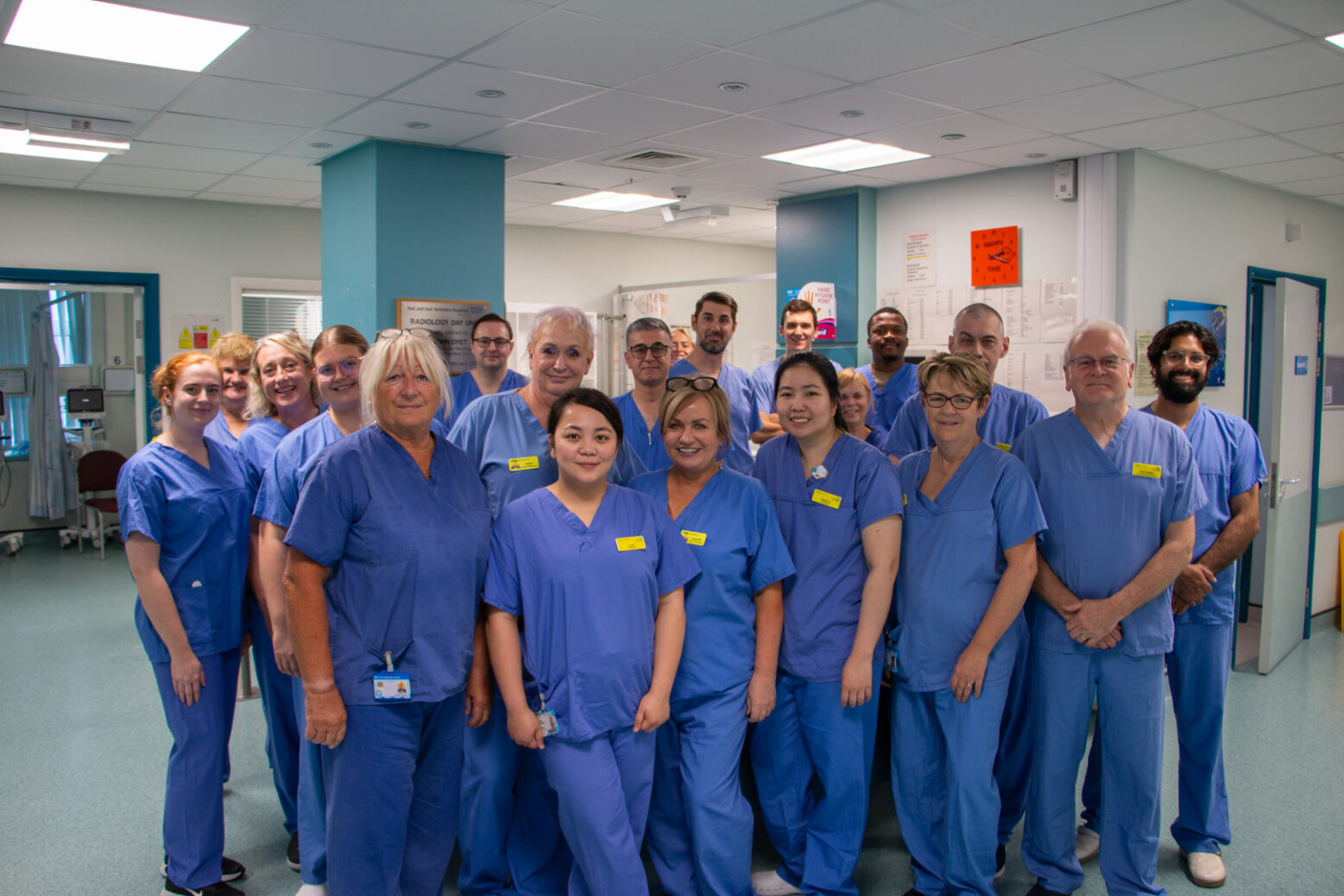Patient praises local team for transforming her life
Doctors in Hull are leading the way when it comes to potentially life-changing, day case surgery.
Hull University Teaching Hospitals NHS Trust has been named as having the best performing Vascular Interventional Radiology (IR) Day Unit in the country, conducting almost 1,200 minimally invasive treatments in a single year.*
One woman who has benefited from the service is Helen Fox, from Gainsborough, Lincolnshire. She says she’s been ‘given her life back’ by staff from the Hull-based team after she underwent treatment for peripheral arterial disease.
Peripheral arterial disease is a debilitating condition caused by the narrowing or blocking of the blood vessels that supply the legs with oxygenated blood. It can lead to difficulties in walking and even gangrene, leading to amputation in its more advanced stages.
Helen, 69, an avid walker found herself unable to engage in one of her greatest passions due to the progression of this condition. She and her husband love to take long walks, especially during vacations where they enjoy exploring new areas.
Helen says: “My husband and I always do an awful lot of walking and I never had any problems. We could walk for miles – especially on holidays, we love going somewhere different and exploring the whole area. We like to sit on the beach sometimes, but that is not the best part of holiday for us. Getting out and about and seeing what needs to be seen was, and we always took the longest route anywhere.
When Helen noticed slight difficulties while walking in 2016, she initially dismissed it. However, in 2019, she sought medical advice, leading to a referral to a physiotherapist in the hopes that exercises would alleviate her symptoms. Unfortunately, the exercises provided limited relief. Later that year, after undergoing scans and evaluations, Helen received a diagnosis of peripheral arterial disease. She anticipated receiving treatment a few months later but was thwarted by the outbreak of the Covid-19 pandemic and subsequent lockdown measures.
In February 2021, hope emerged when Helen received a call from Prof Duncan Ettles, Consultant Interventional Radiologist at the Trust. Despite some ongoing Covid-19 restrictions, Prof Ettles inquired if Helen still wishes to have her condition evaluated and treated. She agreed without hesitation.
Known for its transformative approach to patient care, the Trust’s Radiology Day Unit promptly arranged an appointment for angioplasty and stenting, ensuring her safety by isolating the area where the operation would take place.
Under the expert care and guidance of Prof Ettles and his team, Helen underwent a procedure that involved the insertion of stents to open the blocked arteries which supply blood to the legs.
Helen recounts her experience: “I watched everything they did on a large television monitor, and I thought, this is really good. And after the stents had been fitted, I went back to recovery, laid there for a couple of hours, my husband picked me up and I went home. A week later my husband took me to Cleethorpes, and we walked three miles. It is the best thing that has ever happened to me. They gave me my life back. It is a fantastic thing to have happened.”
Prof Ettles, at the forefront of this transformative care, emphasises the team’s commitment to developing advanced technologies in interventional radiology to provide patients with the best possible care.
He says: “Helen’s case is a great example of the life changing impact we can have on patients with minimally invasive treatment. Almost two-thirds of patients who are suitable for angioplasty and stenting are able to come into hospital, receive the treatment and go home the same day.”
He continues: “And that can now be for many conditions, from difficulty in walking, to patients who are having the aorta replaced inside their abdomen to treat potentially fatal aneurysms. We bring in patients on a day case basis and they have a major operation, which 20 years ago would have meant staying in hospital for weeks with a big scar. Now, they come in, have the procedure and go home later that day.”
Prof Ettles explains the wide range of conditions the Radiology Day Unit addresses, ranging from difficulty in walking to using specialised equipment to remove blood clots from patients’ arteries in the legs and in the brain for acute stroke treatments.
The Unit also specialises in treating cancer patients, patients with kidney failure, major trauma after road accidents and obstetric haemorrhage, a condition that causes uncontrolled bleeding after childbirth.
Prof Ettles explains: “In years gone by, if a patient experienced bleeding after having a baby, all the surgeons could do was to remove the womb whereas we, as interventional radiologists, are able to go in, find and treat the bleeding and often preserve fertility. And it stops women from having a major operation. Lots of hospitals in the country cannot provide this service, but we do. Everything you can think of in terms of interventional radiology, we do that here.”
Helen’s story is just one of many success stories emerging from the Trust’s Radiology Unit. The Unit’s commitment to excellence has led to its recognition as the highest performing interventional centre in the UK for 2022, as acknowledged by the National Vascular Registry.
As a teaching hospital, the Radiology Day Unit plays a pivotal role in training future radiologists. By actively participating in research and innovation, the Unit contributes to advancements in the field of radiology, improving patient outcomes and driving progress in healthcare.
The Trust takes immense pride in the transformative work accomplished by the Unit. Through unwavering commitment to excellence, innovative approaches to diagnosis and treatment, and dedication to advancing the field, the Unit continues improve the lives of patients like Helen.
* Vascular IR data can be found at National Vascular Registry

